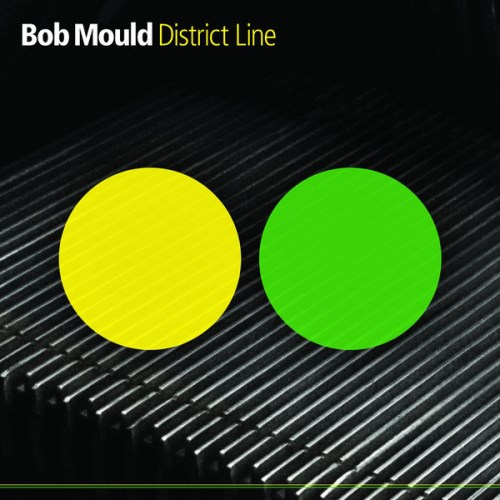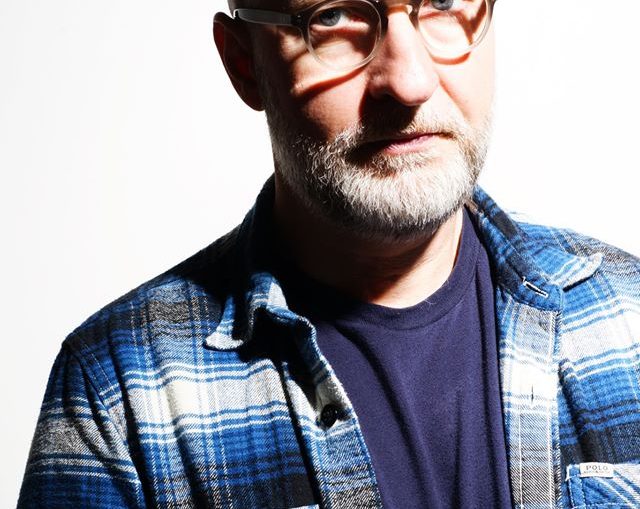See a Little Light to the District Line: Laughing with Bob Mould
by David Pyndus
Bob Mould laughs easily. Sort of a deep chuckle that’s unnerving to those who know him solely through his music, from the pioneering punk of Hüsker Dü or his solo work where he has penned these popular tunes: “Black Sheets of Rain,” “Poison Years,” “I Hate Alternative Rock,” and the vein-popping “Underneath Days” from 2005’s mostly back-to-basics Body of Song.
“When I was younger, especially with Hüskers the overarching theme (of my music) was ‘why is this happening to me?’ — and now it’s just ‘why is this happening?'” Mould ponders from his home studio in Washington, D.C. where he lives inside the District Line, a diamond-shaped perimeter that surrounds the Beltway region.

“Things are more tempered, things are more measured,” he says. “Age will do that.” Mould certainly sounds more relaxed on his new album, the geographically divined District Line than last time and it suits the music, although songs like “Stupid Me” and “Again and Again” still deftly demonstrate the difficulty of maintaining relationships.
From the album’s first moments, you can’t help but notice something else: Mould is really singing, not screaming or shouting but enunciating words and holding phrases. “Please listen to me,” Mould pleads in “Stupid Me,” “and don’t disagree.” Mould may still want things his way but he is pleasant about it, willing to talk.
“I write constantly and I write in all different styles, depending on what kind of mood I’m in,” he explains. “If I’m listening to non-commercial radio streaming on the Internet and they’re playing a lot of indie rock, when I go in the workroom I’m headed in that direction. If I’m listening to electronic stuff trying to find things for my DJ gig… I might head in that direction.”
Regarding District Line, Mould is aware of “how diverse and well-rounded” the finished album turned out. Perhaps that’s why Mould, 47, is recording with other musicians again, 10 years after he famously ‘retired’ from electric rock and termed the accompanying tour “The Last Dog and Pony Show.”
“I realize that my sense of urgency is not as great as it once was, because I had my run at changing the world,” muses Mould, whose band Hüsker Dü was one of the most influential bands of the 1980s and the first of the DIY American bands to sign with a major label (one year before R.E.M. signed with that same label, Warner Bros.). “I did what I could and now I realize that things change a lot more slowly than I realized then.”
In the late 1990s, Mould moved to New York to pursue outside interests, including consulting for a wrestling franchise (to the shock of some) and exploring a newfound love of electronica. It seemed as if he wanted to put the past behind him, not only Hüsker Dü but his short-lived power pop trio Sugar, whose debut Copper Blue was universally heralded, and which earned him a new generation of fans. After releasing four solo albums under his name, two Sugar discs, a live concert, and collection of Sugar outtakes recorded between 1989 to 1998, he headed off in a different direction.
“After the end of ’98, when we did “The Last Dog and Pony Show” and the tour that I presumed would be my final electric band tour, I was living in New York at the time and in ’99 really started integrating myself more into the gay community,” Mould recalls, “and less so in a van with a bunch of guys playing rock music, and just by default was listening to more electronic music and started to hear things that I liked.”
Within a few years Mould would release what many consider an awkward project, a hybrid aimed at blending his distorted guitar with electronic loops and samples. Modulate is still debated as a transitional album. “I really sort of put people through it in ’02 (with Modulate),” he realizes now. “I challenged people with something completely different, I sort of felt that.”
In his newfound artistic quest, Mould moved to D.C. later that year, and began DJ’ing at the 9:30 Club regularly, with keyboardist Rich Morel, in a joint project known as BlowOff. The dance event has grown so popular that they occasionally trek down to the Highline Ballroom in midtown Manhattan.
“Our crowd is 95 percent gay but they come to the rock clubs,” he says. “If we did what we do at a gay club, I don’t know if it would have the impact because I think by taking people out of that familiar environment and into a neutral space, it gets them more into the music, which is what we’re trying to do, update people’s taste in music.”
BlowOff released an album of dance-oriented music in 2006, and Mould says that approach “really informed” songs like the new “Shelter Me,” with its hypnotic trance beat, and “(Shine Your) Light Love Hope” from 2005’s Body of Song.
Mould finished his previous album after several aborted attempts, recording with punk drummer Brendan Canty of Fugazi, BlowOff keyboardist Morel, and cellist Amy Domingues, all of whom return on District Line, along with bassist Jason Narducy. The core group, sans Domingues, toured to enthusiastic response at the time, and they will be touring the U.S. again in the spring, though Canty has other commitments and will be replaced on the road by D.C. drummer Rob Black.
The first single from District Line is a Sugar-infused nugget called “The Silence Between Us,” featuring Mould’s trademark guitar layers, and the comforting thought that “beyond the panic and worry that seems to consume most every thought… lies a calm and steady hand that someday you might see.”
“That one sounded the most like a Kelly Clarkson song,” Mould laughs, realizing he is half serious as he considers the song in the context of the first American Idol winner, “so that’s probably the best way to choose it.” Having been in the business since he was a teenager, Mould is also a keen analyst: “The song is three and a quarter, it’s verse-chorus-verse-chorus-chorus-bridge,” he says, “that’s sort of the formula. It took five minutes to write the song, that’s usually when I know.”
District Line opens with a quasar of a song that encapsulates just about everything Mould does best. “Stupid Now” begins with an acoustic strum, and finds Mould in regret over something he feels he should not have said, Morel’s keyboards and Domingues’ cello offering hints of color. Thick reverberating guitar notes recalling Sugar’s “A Good Idea” keep the tempo while Mould whispers the lyric, until Canty’s drums kick in like a bomb. The heavily processed guitar is classic Mould.
“I’m definitely comfortable with my life, comfortable in my skin at this point,” he says. “That raging emotion that will show up from time to time just didn’t really surface in the last couple of years, I wasn’t feeling particularly vitriolic.” A song like “Very Temporary” certainly has its dark moments, but then again Mould sings: “When I wake from my sleep, outside my window I see a little robin that sings a little sonnet for me / and every morning, I feel just like that bird in that tree.”
The new album was set to conclude with the quasi-orchestral/mild electronica of “Miniature Parade” until Mould instead dusted off a Workbook outtake called “Walls In Time.” (Mould’s 1989 solo debut Workbook is regarded a singer/songwriter classic; a special edition will be released in 2009, though Mould says he has not yet decided what to include as bonus material.)
“‘Walls In Time’ is a beautiful song, and stayed with me for years. People always asked me when I was going to record that song,” says Mould. “The reason it didn’t make Workbook is because there were two songs that were very similar, that and ‘Sinners and their Repentances’… I made a choice back then but have always held that song back in my pocket as something that I would eventually release.”
“Walls In Time” is an acoustic defense of artistic purpose, with Mould questioning the very urge to create. “We all want to leave a mark somewhere for those of us who feign to care,” he allows, “in all unfortunate times we find a way to build up these walls in time.” The underlying cello nails the sentiment. “It just tied the bow on the package, sort of fell into the spot and I thought this is done,” he says. “It was the lucky accident.”
For the 20th anniversary edition of Workbook, Mould says, “I’m just thinking about that now… there’s a lot of things that could be done with it, there’s live presentations, there’s all kinds of stuff that could happen.” He also reports that most of his next studio album is written, so Mould is preparing for a busy 2009 just as 2008 is barely out of the gates.
The District Line tour will include the usual assortment of Mould ballads, Sugar staples, and Hüsker classics, from “Celebrated Summer” to “Makes No Sense At All.” Mould had refused to play Hüsker Dü material in a band setting until three years ago when he decided to loosen up the reigns.
“It was an awkward situation playing the songs with other musicians, until I just said to heck with this,” he says. “The clock’s ticking and this is what people want.” He jokes that they could even toss a BlowOff tune into the set, so anything is possible. “If that makes it more fun for people then we should probably do that, open up the songbook,” says Mould. “Music is supposed to be fun.”


Leave a Reply